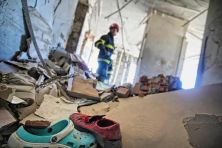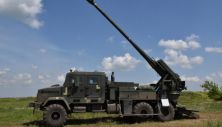If the occupiers are still in the country, then fear and uncertainty are always present.
In the third part of our series of the aftermath of the 2008 Russo-Georgian war, we bring you stories of lives in the administrative border zone.
The administrative border between Georgia and occupied South Ossetia runs more than 50 kilometers and was upgraded with barbed wire in 2011. The border doesn’t only separate villages, but lives and families as well.
84-year-old David Vanishvili often comes to the barbed wire. His daughter and younger grandson living on the other side bring him food, water and medicine. He has been living in occupation for the eleventh year in a row.
“My wife is really ill, but they won’t let her go to a hospital there. She sometimes comes to the barbed wire and cries. This barbed thing has separated our lives. Our daughter lives there, and we live here. Our older grandson lives with us too. Recently the Russian military said that if they see him near the barbed wire again, they’ll arrest him,” said David Vanishvili, a resident of the occupied village
The border even physically divides villages. Three houses in Khurvaleti ended up in occupied land, but only one of them had a resident, Vanishvili himself
“I don’t want to leave. This is my home. If I leave, it will be destroyed, and I’ll never be able to come back here. I would rather kill myself than leave this place,” Vanishvili stated.
About a thousand families in 20 settlements found themselves separated by barbed wire. Their houses stand on different sides. The only way to get into the occupied territory is with a special permit. It is issued by the authorities of the so-called Republic of South Ossetia and only to natives of Tskhinvali region.
“My husband is from there. He has a house there; he was born there. I’m not from Akhalgori myself. I’m a Tbilisi native. They don’t let me through. I have neither a permit nor children. Only my husband can go there. To visit his home and the graves of his relatives,” said Ketevan Gvintsadze, resident of Tserovani village.
Russian soldiers arrest people for trying to cross the demarcation line without a permit. They demand a ransom for freeing them. First offense is $31, the second, four thousand. The military bases are located in Tskhinvali in a village called Akhmadzhi. Previously, around 50 people lived there, but after the conflict, its population has become more than five times smaller.
Every month, people are kidnapped at the border. According to Georgian human rights activists, the number of missing people is around three thousand. At least two Georgian citizens have been murdered. The latest one took place in February of this year. Occupying authorities refused to give up the person’s body for a month.
“He was tortured to death, and the Russian side volunteered to conduct an independent evaluation. We know the independent investigation of the Russian side, which actually controls this South Ossetia with Russian KGB and FSB (Russian Federal Security Service). As the outcome of the investigation, they said that Tatunashvili died of heart failure. That was about a person whose body was entirely mutilated. Here, everyone perfectly understands that it was murder,” said Yegor Kuportev, producer general of STV Channel, Georgia.
There can be no justice in such a case, but Georgia is trying. At the end of June, the parliament adopted the Tatunashvili-Otkhozoria list with the names of more than 30 people who must be held accountable.
“The goal of this list is to identify all those people who were involved in criminal activities against the Georgian state and the people who live here. This is an open list. It’s open for new names. Sooner or later they will be brought to responsibility,” said David Rakviashvili, secretary of the Georgian Defense Council.
Despite the risk of arrest, kidnapping and death, an average of 300 people a day cross the demarcation line checkpoint.












